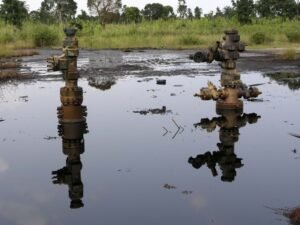By Godwin Oritse
The Nigerian Maritime Administration and Safety Agency (NIMASA) has initiated monitoring operations following an oil spill at the Shell Petroleum Development Company (SPDC) loading terminal in Bonny, Rivers State. The spill, caused by a ruptured pipeline, has raised environmental and socio-economic concerns in the affected region.
SPDC’s Immediate Response
Upon detecting the rupture, SPDC took swift measures to contain the spill:
- Pipeline Shutdown: The affected pipeline was immediately shut down to prevent further leakage.
- Deployment of Containment Booms: To mitigate the spread of oil and protect nearby communities, containment booms were deployed.
Despite these efforts, the oil has reached the shoreline, prompting fears of adverse impacts on the ecosystem and local livelihoods.
NIMASA’s Emergency Operations
In response to the spill, NIMASA has activated its Emergency Operations Center (EOC) to oversee the situation and implement an effective response plan.
Key Actions Taken by NIMASA:
- Situation Monitoring: The agency is closely tracking the spill’s progression to assess its scale and severity.
- Stakeholder Collaboration: NIMASA is working alongside SPDC and other relevant parties to determine the most effective remediation measures.
- Public Assurance: The agency has reassured the public of its commitment to minimizing the environmental and social consequences of the spill.
“Our priority is to protect the environment, safeguard livelihoods, and ensure a swift response to mitigate the spill’s impact,” NIMASA stated.
Environmental and Economic Concerns
The oil spill has already reached the shoreline, raising serious concerns about:
- Ecosystem Damage: The spill poses a threat to marine and coastal ecosystems, including fish populations and mangroves.
- Livelihoods: Communities that rely on fishing and farming in the affected areas may experience economic hardship.
- Health Risks: Prolonged exposure to oil and contaminated water could lead to health complications for nearby residents.
Call for Transparency and Accountability
Environmental groups and local stakeholders are urging SPDC and NIMASA to ensure transparency in the assessment and cleanup process. Community leaders have also called for adequate compensation for those affected by the spill.
Moving Forward: Collaborative Efforts
The oil spill underscores the need for stricter monitoring of pipelines and enhanced collaboration between government agencies, oil companies, and communities to prevent future incidents. Key recommendations include:
- Pipeline Integrity Checks: Regular maintenance and inspection of pipelines to prevent ruptures.
- Improved Response Mechanisms: Faster deployment of containment and cleanup resources.
- Community Engagement: Involving local communities in monitoring and response efforts to build trust and ensure swift action.
Conclusion
The Bonny Terminal oil spill highlights the ongoing challenges of balancing industrial operations with environmental protection in Nigeria. As NIMASA continues its monitoring efforts, the priority remains on mitigating the spill’s impact and ensuring accountability from all stakeholders involved.


